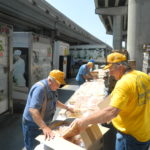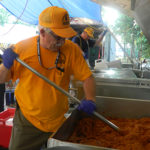Last week, Texas experienced the worst disaster in its history. Nineteen trillion gallons of water fell over the southeastern portion of Texas. Houston and its surrounding areas were inundated with over 50 inches of rainfall, and 30,000 people were displaced.
Recovery costs will be in the hundreds of billions of dollars, and the process of rebuilding will take years, if not decades. The situation is grim, but Texans everywhere, and Texas Baptists in particular, have shown readiness to take on this task of nearly unimaginable proportions.
Relief problems
Unfortunately, a “second disaster” comes after most major events like Hurricane Harvey.
Relief workers use this phrase to describe the rush of unhelpful donations that stream into disaster-affected areas, creating more problems than they solve. Items one thinks would be helpful after a disaster become a disaster in their own right.
Literal tons of used clothing, toys, household goods and other items are given to agencies that don’t have the time or manpower to sort, organize and clean these things. All of these unusable donations subsequently either clog already limited storage spaces or are destroyed.
After Hurricane Mitch ripped through Honduras in 1998, supply planes couldn’t land because runways had become piled with boxes of used clothing donated by well-meaning Americans. I’m sure not a few of those boxes preventing supply planes from landing were donated by well-meaning churches.
‘More harm than good’
According to disaster relief experts, donating any physical goods that haven’t been specifically called for by a local relief organization almost always does more harm than good, with used clothing being the worst offender. At best, these items overwhelm relief workers who need to spend time and resources elsewhere. At worst, it actively impedes ongoing relief efforts, as was the case in Honduras.
As my fellow columnist Zac Harrel reminded us last week, we have a responsibility to help our brothers and sisters in disaster-affected areas. We must, however, do this well. When we send goods and donations that haven’t been specifically asked for, we do harm, not good.
What does Houston need from us, then?
Sign up for our weekly edition and get all our headlines in your inbox on Thursdays
The best gift
Our money.
In times of disaster and recovery, money is desperately needed more than almost any physical good. Money given to the right organization can become food for the hungry, clothing for the needy, shelter for the homeless, medicine for the sick and so on, and all without requiring hours of volunteer work sorting through boxes.
Money is essential to recovery efforts, especially for a disaster the size of Hurricane Harvey. Used clothing, teddy bears, and random goods may correspond to things victims have lost, but a post-hurricane city simply doesn’t have the means of matching goods to people in need.
Myles Werntz gave some great guidelines last week for responsible and effective giving, especially in the context of your local church. Responsible and effective giving is what Houston needs right now.
We Texas Baptists have a huge task in front of us as thousands of our brothers and sisters are in dire need. Giving used clothes or spare items we don’t need any more isn’t real giving — it’s making ourselves feel that we’ve helped without actually sacrificing anything. Giving that helps others is giving that disadvantages ourselves.
Houston needs our dollars. Houston needs the time of those of us with particular skills and training (if this is you, or you would like it to be, join the Texas Baptist Men). Even if the intentions are good, Houston doesn’t need our used clothing. Our giving must match the need.
Let’s avoid the second disaster. Let’s not burden relief workers in Houston with goods they didn’t ask for or need. Let’s really help Houston rebuild. This will take the sacrificial giving of our money, time and abilities, but Texas Baptists aren’t known for backing down from a challenge.
Jake Raabe is a student at Baylor University’s George W. Truett Theological Seminary in Waco, Texas and a writer. Follow him on his Facebook page.














We seek to connect God’s story and God’s people around the world. To learn more about God’s story, click here.
Send comments and feedback to Eric Black, our editor. For comments to be published, please specify “letter to the editor.” Maximum length for publication is 300 words.